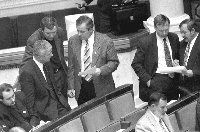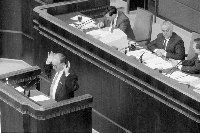By Hevorh KARAPETIAN
Let us consider the right-centrist parties increasingly active on the political
arena - Rukh and the National Democratic Party - in their dynamics and
in the context of the Right splitting up within Ukraine's political range,
and I mean not the breakup between the parties but rifts within these parties,
such that each is divided into irreconcilable opponents, some standing
for and the others against reform in Ukraine.
Rukh emerged from the classical dissident movement, siding with the
nationally conscious cultural elite. Later, after rifts and scandals, with
a host of new national parties springing from it, it was "stabilized" under
Vyacheslav Chornovil and remains so (which is not easy at times). Its ideology
is rooted in the Ukrainian national idea, Ukrainization of the populace,
and the priority of the European direction of development against the Russian
one.
Its future is in a number of young promising politicians that are well
known in Ukraine today (e.g., Lavrynovych, Zayets, Kostenko).
To understand Rukh's position on the Ukrainian political map, and to
have a better idea about this map, it is worth examining the dynamism of
Rukh's interrelation with those officially in power. The party first struggled
against Leonid Kravchuk as presidential candidate, then against his successor
Leonid Kuchma, and now it is campaigning against Yevhen Marchuk and Oleksandr
Moroz.
As was to be expected, its latest convention focused on the presidential
elections. Some Rukh adherents, primarily of the younger generation, along
with the Rivne organization and several noted figures, perhaps embodying
the inveterate anti-Chornovil wing, support Kostenko. As for the Rukh leader,
he did his best to torpedo this candidacy, persistently backing Hennady
Udovenko who is considerably older and stands no chance whatsoever of winning
the next campaign, although no one can deny his merits as a veteran politician.
In the end he was nominated, meaning that the Rukh leadership is ready
to support the current powers that be. This is the only possible inference
from the situation that has developed. Everybody understands that Udovenko's
would be an impasse figure on any roster and his name has never appeared
in the top ten of any poll. Thus, his nomination and further support from
the new Movement for Reform and Order bloc, considering Messrs. Chornovil's
and Pynzenyk's experience (sufficient to regard Udovenko as a zero option),
indicates a different strategy.
The Rukh-PRP project, aimed, in their own words, at strengthening the
right flank of Ukraine's political range and putting forward an alternative
Right candidate, is nothing but a good old strategy, one from a set of
election technologies, designed to create auxiliary centers of gravity
to distract the electorate from potential rivals in this political and
ideological confrontation. Without doubt, Hennady Udovenko will run in
the campaign, but will surely give what votes he collects over to Leonid
Kuchma in the runoff.
NDP emerged from two sources. The first, the Party for the Democratic
Rebirth of Ukraine, the former Democratic Platform of the CPSU, was a political
organization popular practically all over the USSR shortly before its collapse.
It was made up of Communists bent on the ideas of democracy, civil society,
civilized bloodless reforms within the party, dismantling the Soviet empire,
and converting the totalitarian society into an open one. Secreted within
the Soviet Communist Party was a tremendous potential of begetting political
entities for precisely this conversion. Among the democratic members were
quite a number of currently well-known political figures such as Filenko,
Yemets, and Hryniov.
The other source was the Labor Congress of Ukraine, made up of former
Communist Youth League functionaries headed by the last Soviet Komsomol
leader Anatoly Matviyenko. By the time of merger LCU had gained sufficient
political weight due to the high quality organizational schooling its stalwarts
received under the totalitarian rule.
Unlike Rukh and the Communist Party, let alone all other radical political
movements, NDP at times falters organizationally due to its ideological
fuzziness.
NDP is firmly established as a party of power but not a winning one
because during the previous elections it scored no victories and ministerial
portfolio went its way because it was so decided administratively. After
all, President Kuchma eventually began to regard this party as his main
political support, but again he did it only so often and not in so many
words.
There could be nothing worse for a country struggling on its way to
democracy and civil society than the semitotalitarian system in today's
Ukraine, where the government is appointed by the nationwide elected President
not by a party but by the ill-famed Soviet principle of selecting cadres
"proceeding from administrative and political merits."
NDP is currently clearly divided into two camps. In this context the
acronym NDP would be best deciphered as the Nomenklatura-Democratic Party,
meaning two basic groups which determine the outline of its internal confrontation.
The first group is the NDP nomenklatura proper, acting under slogans
of supporting the Cabinet and Premier Pustovoitenko (e.g., Tolstoukhov,
Petrov, Diomyn, etc.)
The other group is mostly composed of NDP members that joined the party
from the old Party for the Democratic Rebirth of Ukraine (e.g., Filenko,
Yemets, Stetskiv, and other former Democratic Platform members), but there
are also others. Everything points to Anatoly Matviyenko being mentally
and practically oriented toward precisely this camp, despite his LCU-Komsomol
background.
Figuratively speaking, NDP is assuming a posture increasingly like a
piece of string. Its relationship with the President is quite demonstrative.
It is safe to assume now that the NDP team's influence on Mr. Kuchma's
actions tends to waver between certain and uncertain, definite and indefinite.
Speaking of influence on the Chief Executive, it seems more appropriate
to refer oneself to other parties such as the SDPU(o) or Greens. But here,
too, one is faced with yet another mystery of the post-Soviet way of life
in Ukraine: neither of these parties assumes any political responsibility
for what the President does. In fact, they are more frequently "seen" in
Oleksandr Tkachenko's parliamentary Left, voting in unison with the Communists,
Socialists, and Hromada on a number of issues of principal (as on Ukraine's
accession to the Interparliamentary Assembly and on the Crimean Constitution).
This is additional proof that the line drawn between political ideologies
and priorities in Ukrainian society passes not between the parties but
follows a much more sophisticated trajectory within these parties.
Zlahoda (Harmony) is a bloc formed quite recently, meaning that the
part of the spectrum backing the existing regime has finally united. True
democrats must be seriously worried about Ukraine's prospects. They must
respond worthily and fear no precarious bends and treacherous potholes
on this road, because they are certain to be followed by other alliances
and associations that will be considerably stronger and more befitting
the situation; they are truly needed by Ukrainian society at this complicated
stage of its history. Constructive forces within these parties ought to
show as much enthusiasm as do those backing the existing regime, uniting
into Zlahoda and Reforms and Order, and meet one another halfway. And practice
shows that such constructive forces are present in the most influential
Right parties, Rukh and NDP. There is little doubt that such forces are
also to be found in Reforms and Order.








